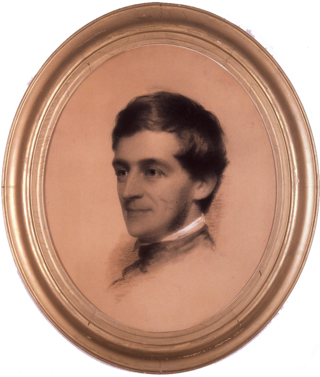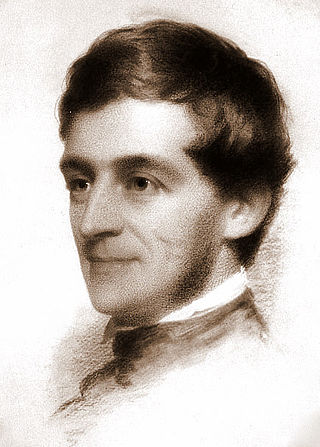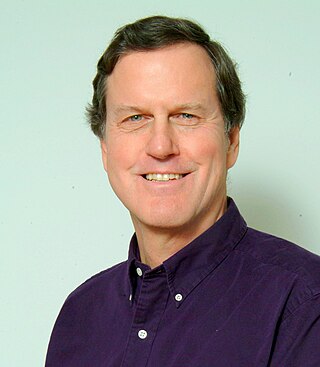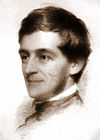
Ralph Waldo Emerson, who went by his middle name Waldo, was an American essayist, lecturer, philosopher, abolitionist, and poet who led the Transcendentalist movement of the mid-19th century. He was seen as a champion of individualism and critical thinking, as well as a prescient critic of the countervailing pressures of society and conformity. Friedrich Nietzsche thought he was "the most gifted of the Americans,” and Walt Whitman called him his "master.”
Transcendentalism is a philosophical, spiritual, and literary movement that developed in the late 1820s and 1830s in the New England region of the United States. A core belief is in the inherent goodness of people and nature, and while society and its institutions have corrupted the purity of the individual, people are at their best when truly "self-reliant" and independent. Transcendentalists saw divine experience inherent in the everyday, rather than believing in a distant heaven. Transcendentalists saw physical and spiritual phenomena as part of dynamic processes rather than discrete entities.

The Phi Beta Kappa Society (ΦΒΚ) is the oldest academic honor society in the United States, and the most prestigious, due in part to its long history and academic selectivity. Phi Beta Kappa aims to promote and advocate excellence in the liberal arts and sciences, and to induct the most outstanding students of arts and sciences at only select American colleges and universities. It was founded at the College of William and Mary on December 5, 1776, as the first collegiate Greek-letter fraternity and was among the earliest collegiate fraternal societies. Since its inception, 17 U.S. presidents, 40 U.S. Supreme Court justices, and 136 Nobel laureates have been inducted as members.

"Self-Reliance" is an 1841 essay written by American transcendentalist philosopher Ralph Waldo Emerson. It contains the most thorough statement of one of his recurrent themes: the need for each person to avoid conformity and false consistency, and follow his or her own instincts and ideas. It is the source of one of his most famous quotations:

Nature is a book-length essay written by Ralph Waldo Emerson, published by James Munroe and Company in 1836. In the essay Emerson put forth the foundation of transcendentalism, a belief system that espouses a non-traditional appreciation of nature. Transcendentalism suggests that the divine, or God, suffuses nature, and suggests that reality can be understood by studying nature. Emerson's visit to the Muséum National d'Histoire Naturelle in Paris inspired a set of lectures he later delivered in Boston which were then published.

Christopher Pearse Cranch was an American writer and artist.

First Parish in Cambridge is a Unitarian Universalist church, located in Harvard Square in Cambridge, Massachusetts. It is a Welcoming Congregation and a member of the Unitarian Universalist Association. The church is notable for its almost 400-year history, which includes pivotal roles in the development of the early Massachusetts government, the creation of Harvard College, and the refinement of current liberal religious thought.
"The Over-Soul" is an essay by Ralph Waldo Emerson first published in 1841. With the human soul as its overriding subject, several general themes are treated: (1) the existence and nature of the human soul; (2) the relationship between the soul and the personal ego; (3) the relationship of one human soul to another; and (4) the relationship of the human soul to God. The influence of Eastern religions, including Vedanta, is plainly evident, but the essay also develops ideas long present in the Western philosophical canon and the theology of Emanuel Swedenborg.

The American Scholar is the quarterly literary magazine of the Phi Beta Kappa Society, established in 1932. The magazine has won fourteen National Magazine Awards from the American Society of Magazine Editors from 1999 to present, including awards for General Excellence. Additionally, the magazine has won four Utne Independent Press Awards from Utne Reader, most recently in 2011 in the category "Best Writing".

John William Miller (1895–1978) was an American philosopher in the idealist tradition. His work appears in six published volumes, including The Paradox of Cause (1978) and most recently The Task of Criticism (2006). His principal philosophical ambitions were 1) to reconcile the idealism of Josiah Royce and the pragmatism of William James and 2) to integrate philosophical thought and historical thought. As testimony to the integrative nature of his thinking, Miller referred to his philosophy as a "historical idealism” and a “naturalistic idealism.”
Joel Miles Porte was an American literary scholar, who was an internationally renowned authority on the life and work of Ralph Waldo Emerson.
Eloise Quiñones Keber was Professor Emeritus of Art History at Baruch College and The Graduate Center, CUNY, where she specialized in Pre-Columbian and early colonial Latin American art. She earned her Ph.D from Columbia University in 1984.
George M. Fredrickson was an American author, activist, historian, and professor. He was the Edgar E. Robinson Professor of United States History at Stanford University until his retirement in 2002. After his retirement he continued to publish several texts, authoring a total of eight books and editing four more in addition to writing various articles. One of his best known works remains White Supremacy: A Comparative Study of American and South African History, which received the Ralph Waldo Emerson Prize and the Merle Curti Award as well as made him a finalist of the Pulitzer Prize for History and the National Book Award.

David S. Reynolds is an American literary critic, biographer, and historian who has written about American literature and culture. He is the author or editor of fifteen books, on the Civil War era—including figures such as Walt Whitman, Abraham Lincoln, Herman Melville, Nathaniel Hawthorne, Edgar Allan Poe, Ralph Waldo Emerson, Henry David Thoreau, Emily Dickinson, Harriet Beecher Stowe, George Lippard, and John Brown. Reynolds has been awarded the Bancroft Prize, the Lincoln Prize, the Christian Gauss Award, the Ambassador Book Award, the Gustavus Myers Book Award, the John Hope Franklin Prize, and was a finalist for the National Book Critics Circle Award. He is a regular reviewer for The New York Times Book Review.
The Phi Beta Kappa Award in Science is given annually by the Phi Beta Kappa Society to authors of significant books in the fields of science and mathematics. The award was first given in 1959 to anthropologist Loren Eiseley.
The Ralph Waldo Emerson Award is a non-fiction literary award given by the Phi Beta Kappa society, the oldest academic society of the United States, for books that have made the most significant contributions to the humanities. Albert William Levi won the first of these awards, in 1960.
"Politics" is an essay written by Ralph Waldo Emerson. It is part of his Essays: Second Series, published in 1844. A premier philosopher, poet and leader of American transcendentalism, he used this essay to belie his feelings on government, specifically American government. His impact on New England thought and his views on pragmatism influenced the likes of Henry David Thoreau, Orestes Brownson, and Frederich Nietzsche, among others.
Martin Foss (1889–1968) was a German-born American philosopher, professor, and scholar.

The transparent eyeball is a philosophical metaphor originated by American transcendentalist philosopher Ralph Waldo Emerson. In his essay Nature, the metaphor stands for a view of life that is absorbent rather than reflective, and therefore takes in all that nature has to offer without bias or contradiction. Emerson intends that the individual become one with nature, and the manner of the transparent eyeball is an approach to achieving it.
Gamaliel Bradford (1795–1839) was an American physician, the superintendent of Massachusetts General Hospital, and an abolitionist.











